| Listing 1 - 10 of 12 | << page >> |
Sort by
|
Book
ISBN: 1400876613 9781400876617 0691061394 9780691061399 9780691622248 0691622248 9780691061399 0691622248 Year: 2015 Publisher: Princeton, NJ
Abstract | Keywords | Export | Availability | Bookmark
 Loading...
Loading...Choose an application
- Reference Manager
- EndNote
- RefWorks (Direct export to RefWorks)
Exploring the consciousness and creative impulse of William Dean Howells, Professor Vanderbilt finds that Howells' personality reflected the mixed feelings of the American mind in an ambivalent and transitional society. By this interpretation he introduces a new and imaginative approach to the writer and his work, and Howells emerges as one of the major American literary figures of the late nineteenth century. The author's impressive research into all of Howells' works is evident in his discussion of four novels which appeared in the 1880's, The Undiscovered Country, A Modern lnstance, The Rise of Silas Lapham, and A Hazard of New Fortunes. Originally published in 1968.The Princeton Legacy Library uses the latest print-on-demand technology to again make available previously out-of-print books from the distinguished backlist of Princeton University Press. These editions preserve the original texts of these important books while presenting them in durable paperback and hardcover editions. The goal of the Princeton Legacy Library is to vastly increase access to the rich scholarly heritage found in the thousands of books published by Princeton University Press since its founding in 1905.
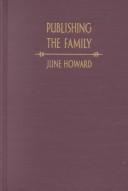
ISBN: 1283061996 9786613061997 0822380412 0822327627 0822327716 Year: 2001 Publisher: Durham [N.C.] : Duke University Press,
Abstract | Keywords | Export | Availability | Bookmark
 Loading...
Loading...Choose an application
- Reference Manager
- EndNote
- RefWorks (Direct export to RefWorks)
Interweaves literary and publishing histories around the collaborative novel THE WHOLE FAMILY in order to explore categories of readers and writers in the U.S. during the first two decades of the twentieth-century.
Literature publishing --- Serialized fiction --- Domestic fiction, American --- Fiction --- History --- History and criticism. --- Whole family. --- Howells, William Dean, --- Howells, W. D. --- Howells, William D. --- Criticism and interpretation. --- Harper's bazar.
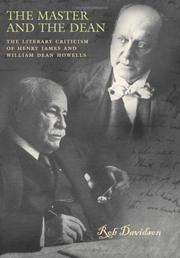
ISBN: 0826215793 0826264689 9780826264688 9780826215796 Year: 2005 Publisher: Columbia University of Missouri Press
Abstract | Keywords | Export | Availability | Bookmark
 Loading...
Loading...Choose an application
- Reference Manager
- EndNote
- RefWorks (Direct export to RefWorks)
"Comparative study of Henry James's and William Dean Howells's literary criticism. Examines the interrelationship between the men, emphasizing their aesthetic concerns and attitudes toward the market and audience, and their beliefs concerning the moral value of fiction and the United States as a literary subject, and writings about each other"--Provided by publisher.
James, Henry --- Knowledge --- Literature --- Howells, William Dean --- American literature --- History and criticism --- Theory, etc. --- Criticism --- United States --- History --- 20th century --- 19th century --- James, Henry, --- Howells, William Dean, --- Howells, W. D. --- Howells, William D. --- Dzheĭms, G. --- Dzheĭms, Genri, --- Jeimsŭ, Henri, --- Джеймс, Генри, --- ג׳יימס, הנרי, --- ג׳ײמס, הנרי, --- Τζειος, Χενρι, --- جميس، هينري، --- جيمز، هنرى --- Literature.
Book
ISBN: 9780813161310 0813161312 0813130212 Year: 1988 Publisher: Lexington The University Press of Kentucky
Abstract | Keywords | Export | Availability | Bookmark
 Loading...
Loading...Choose an application
- Reference Manager
- EndNote
- RefWorks (Direct export to RefWorks)
No other American novelist has written so fully about language -- grammar, diction, the place of colloquialism and dialect in literary English, the relation between speech and writing -- as William Dean Howells. The power of language to create social, political, and racial identity was of central concern to Americans in the nineteenth century, and the implications of language in this regard are strikingly revealed in the writings of Howells, the most influential critic and editor of his age.In this first full-scale treatment of Howells as a writer about language, Elsa Nettels offers a historic
Race in literature. --- Americanisms in literature. --- Social classes in literature. --- English language --- Language and languages in literature. --- Speech and social status --- National characteristics, American, in literature. --- Social classes and language --- Social classes and speech --- Social status and language --- Social status and speech --- Speech and social classes --- Social status --- American English --- American language --- English language in the United States --- Americanisms --- Howells, William Dean, --- Howells, W. D. --- Howells, William D. --- Knowledge --- America. --- Germanic languages
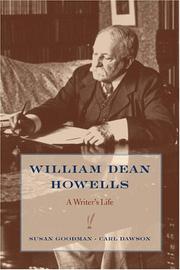
ISBN: 0520238966 1282357204 9786612357206 052093024X 1598755498 9780520930247 1417595906 9781417595907 9781598755497 9780520238961 6612357207 9781282357204 Year: 2005 Publisher: Berkeley University of California press
Abstract | Keywords | Export | Availability | Bookmark
 Loading...
Loading...Choose an application
- Reference Manager
- EndNote
- RefWorks (Direct export to RefWorks)
Possibly the most influential figure in the history of American letters, William Dean Howells (1837-1920) was, among other things, a leading novelist in the realist tradition, a formative influence on many of America's finest writers, and an outspoken opponent of social injustice. This biography, the first comprehensive work on Howells in fifty years, enters the consciousness of the man and his times, revealing a complicated and painfully honest figure who came of age in an era of political corruption, industrial greed, and American imperialism. Written with verve and originality in a highly absorbing style, it brings alive for a new generation a literary and cultural pioneer who played a key role in creating the American artistic ethos. William Dean Howells traces the writer's life from his boyhood in Ohio before the Civil War, to his consularship in Italy under President Lincoln, to his rise as editor of Atlantic Monthly. It looks at his writing, which included novels, poems, plays, children's books, and criticism. Howells had many powerful friendships among the literati of his day; and here we find an especially rich examination of the relationship between Howells and Mark Twain. Howells was, as Twain called him, "the boss" of literary critics-his support almost single-handedly made the careers of many writers, including African Americans like Paul Dunbar and women like Sarah Orne Jewett. Showcasing many noteworthy personalities-Henry James, Edmund Gosse, H. G. Wells, Stephen Crane, Emily Dickinson, and many others-William Dean Howells portrays a man who stood at the center of American literature through the late nineteenth and early twentieth centuries.
Howells, William Dean --- Critics --- Novelists, American --- Howells, William Dean, --- Howells, W. D. --- Howells, William D. --- Novelists [American ] --- 19th century --- Biography --- United States --- american authors. --- american imperialism. --- american letters. --- american literature. --- atlantic monthly. --- biography. --- civil war. --- classics. --- edmund gosse. --- emily dickinson. --- gender. --- greed. --- henry james. --- hg wells. --- industry. --- journalism. --- justice. --- labor. --- lincoln. --- literary criticism. --- literary movement. --- literature. --- naturalism. --- nonfiction. --- ohio. --- paul dunbar. --- political corruption. --- poverty. --- progressive era. --- realism. --- regionalism. --- robber barons. --- sarah orne jewett. --- social change. --- social justice. --- stephen crane. --- twain. --- wealth. --- william dean howells.
Book
ISBN: 0814762638 0585081174 9780585081175 9780814761724 0814761720 0814761720 Year: 1991 Publisher: New York, NY : New York University Press,
Abstract | Keywords | Export | Availability | Bookmark
 Loading...
Loading...Choose an application
- Reference Manager
- EndNote
- RefWorks (Direct export to RefWorks)
"Dancing in Chains is far more than a sensitive biography (though it is surely that); it is also a model of psychologically informed social and cultural history. Olsen recognizes that psychic conflicts often play themselves out on a higher plane, that psychic and intellectual history are intertwined. He presents a wonderful nuanced picture of Howells."-Jackson Lears,Rutgers University In this insightful study of the childhood and youth of William Dean Howells, Dancing in Chains demonstrates how the turbulent social and cultural changes of the early nineteenth century shaped the young Howells's emotional and intellectual life. His early diaries, letters, poetry, fiction, and newspaper columns are used to illustrate Olsen's argument, which also in turn throws light on the dominant tensions in antebellum America. Accepting the emergent middle-class ethos of civilized morality, with its new conceptions of child rearing and gender spheres, Howells's parents urged him to achieve self-control and individual success while also teaching him to seek the good of others rather than his own glory. For Howells the conflicts coalesced at the time of his leaving home, an increasing common rite of passage for antebellum youth. Trying to affirm his sense of literary vocation, he tested his aspirations against the family's Swedenborgian religious convictions and the antislavery commitments of his village while experimenting with competing literary ideologies in the process of meeting the demands of the new mass reading audience. For Howells the resulting tensions eased toward the end of his youth but reappeared in his more mature works of fiction and social criticism in later years. Portraying the ordeal of coming of age during a momentous period of American history, Dancing in Chains is a fascinating study with a broad appeal to general readers as well as scholars.
Critics --- Novelists, American --- Biography. --- Howells, William Dean, --- Howells, W. D. --- Howells, William D. --- Childhood and youth. --- Ohio --- United States --- Ohayo --- Ohaĭo --- State of Ohio --- أوهايو --- Ūhāyū --- Штат Агаё --- Shtat Ahai︠o︡ --- Агаё --- Ahai︠o︡ --- Охайо --- Okhaĭo --- Oohááyoo Hahoodzo --- Οχάιο --- Ochaio --- Ngò-hài-ngò --- 오하이오 주 --- Ohaio-ju --- 오하이오 --- Ohaïyo --- אוהיו --- מדינת אוהיו --- Medinat Ohayo --- Ohium --- Respublica Ohioensis --- Ohajas --- Охајо --- Ohajo --- Охайо Муж Улс --- Okhaĭo Muzh Uls --- オハイオ州 --- Ohaioshū --- オハイオ --- Ogayo --- Огайо --- Ogaĭo --- אהאיא --- 俄亥俄州 --- Ehai'e Zhou --- 俄亥俄 --- Ehai'e --- Social life and customs. --- Social life and customs --- Howells, William Dean --- Biography --- Youth --- Novelists [American ] --- 19th century --- 1783-1865
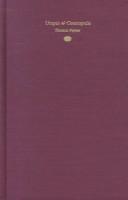
ISBN: 0822322471 0822322307 1322112622 0822398907 Year: 1998 Publisher: Durham Duke university press
Abstract | Keywords | Export | Availability | Bookmark
 Loading...
Loading...Choose an application
- Reference Manager
- EndNote
- RefWorks (Direct export to RefWorks)
When did Americans first believe they were at the center of a truly global culture? How did they envision that culture and how much do recent attitudes toward globalization owe to their often utopian dreams? In Utopia and Cosmopolis Thomas Peyser asks these and other questions, offers a reevaluation of American literature and culture at the dawn of the twentieth century, and provides a new context for understanding contemporary debates about America’s relation to the rest of the world.Applying current theoretical work on globalization to the writing of authors as diverse as Edward Bellamy, Charlotte Perkins Gilman, William Dean Howells, and Henry James, Peyser reveals the ways in which turn-of-the-century American writers struggled to understand the future in a newly emerging global community. Because the pressures of globalization at once fostered the formation of an American national culture and made national culture less viable as a source of identity, authors grappled to find a form of fiction that could accommodate the contradictions of their condition. Utopia and Cosmopolis unites utopian and realist narratives in subtle, startling ways through an examination of these writers’ aspirations and anxieties. Whether exploring the first vision of a world brought together by the power of consumer culture, or showing how different cultures could be managed when reconceived as specimens in a museum, this book steadily extends the horizons within which late nineteenth- and early twentieth-century American literature and culture can be understood.Ranging widely over history, politics, philosophy, and literature, Utopia and Cosmopolis is an important contribution to debates about utopian thought, globalization, and American literature.
American fiction --- Internationalism in literature. --- Nationalism in literature. --- Realism in literature. --- Utopias in literature. --- History and criticism. --- Internationalism in literature --- Nationalism in literature --- Realism in literature --- Utopias in literature --- Utopian literature --- Neorealism (Literature) --- Magic realism (Literature) --- Mimesis in literature --- History and criticism --- Bellamy, Edward, --- Gilman, Charlotte Perkins, --- Howells, William Dean, --- James, Henry, --- Howells, W. D. --- Howells, William D. --- Stetson, Charlotte Perkins, --- Gilman, Charlotte Perkins Stetson, --- Perkins, Charlotte Anna, --- Stetson, Charles Walter, --- Bellamy, Edvard, --- Beramī, Edowādo, --- בעלאמי, ע. --- בעללאמי, א. --- Criticism and interpretation. --- James, Henry --- Dzheĭms, G. --- Dzheĭms, Genri, --- Jeimsŭ, Henri, --- Джеймс, Генри, --- ג׳יימס, הנרי, --- ג׳ײמס, הנרי, --- Τζειος, Χενρι, --- جميس، هينري، --- جيمز، هنرى --- Bellamy, Edward --- Bellamy, Edvard --- Beramī, Edowādo
Book
ISBN: 9780195391169 0195391160 0199866651 0199889309 1282328956 0199736804 9786612328954 0199964106 Year: 2009 Publisher: New York Oxford university press
Abstract | Keywords | Export | Availability | Bookmark
 Loading...
Loading...Choose an application
- Reference Manager
- EndNote
- RefWorks (Direct export to RefWorks)
Authors, American --- Male friendship --- History. --- Twain, Mark, --- Twichell, Joseph Hopkins, --- Howells, William Dean, --- Rogers, Henry Huttleston, --- Friends and associates. --- Friendship between men --- Friendship in men --- Mens' friendship --- Friendship --- History --- Twichell, J. H. --- Tvėn, Mark, --- Tuėĭn, Mark, --- Tuwayn, Mārk, --- Twayn, Mārk, --- Tʻu-wen, Ma-kʻo, --- Tven, M. --- Touen, Makū, --- Twain, Marek, --- Make Tuwen, --- Tuwen, Make, --- Make Teviin, --- Твен, Марк, --- Touain, Mark, --- טבןַ, מרק, --- טוויין, מארק, --- טוויין, מרק, --- טווין, מארק, --- טווין, מרק, --- טווען, מארק, --- טוין, מרק, --- טװען, מארק, --- טװײן, מארק, --- 馬克吐温, --- Clemens, Samuel Langhorne, --- Snodgrass, Quintus Curtius, --- Conte, Louis de, --- Howells, W. D. --- Howells, William D. --- Tuvāyn, Mārk, --- تواين، مارک --- Twain, Mark --- Tvėn, Mark --- Tuėĭn, Mark --- Tuwayn, Mārk --- Twayn, Mārk --- Tʻu-wen, Ma-kʻo --- Touen, Makū --- Twain, Marek --- Make Tuwen --- Tuwen, Make --- Make Teviin --- Твен, Марк --- Touain, Mark --- Tuvāyn, Mārk --- Tvāyn, Mārk --- Clemens, Samuel Langhorne --- Snodgrass, Quintus Curtius --- Conte, Louis de --- Bromance (Male friendship) --- Men's friendship
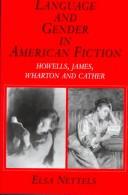
ISBN: 0813917247 Year: 1997 Publisher: Charlottesville University Press of Virginia
Abstract | Keywords | Export | Availability | Bookmark
 Loading...
Loading...Choose an application
- Reference Manager
- EndNote
- RefWorks (Direct export to RefWorks)
American fiction --- Male authors --- History and criticism --- Women authors --- English language --- United States --- Sex differences --- Women and literature --- History --- Authorship --- Howells, William Dean --- Language --- James, Henry --- Wharton, Edith Newbold --- Cather, Willa Sibert --- Sex role in literature --- Germanic languages --- American literature --- Literature --- Male authors&delete& --- Women authors&delete& --- Cather, Willa, --- Howells, William Dean, --- Wharton, Edith, --- Jones, Edith Newbold --- Olivieri, David, --- Wharton, Edith Newbold Jones, --- Уортон, Эдит, --- Gouorton, Intith, --- Dzheĭms, G. --- Dzheĭms, Genri, --- Jeimsŭ, Henri, --- Джеймс, Генри, --- ג׳יימס, הנרי, --- ג׳ײמס, הנרי, --- Τζειος, Χενρι, --- جميس، هينري، --- جيمز، هنرى --- Howells, W. D. --- Howells, William D. --- Katėr, Villa, --- Cather, Willa Sibert, --- Cather, Wilella, --- Catherová, Willa, --- קאתר, וילה, --- Kāz̲ar, Vīlā, --- Kāz̲ir, Vīlā, --- کاذر، ويلا --- Language.
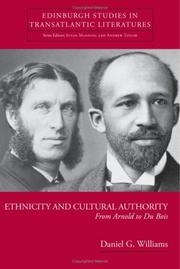
ISBN: 0748622055 9780748622054 9780748626274 9786610715718 0748651993 1280715715 0748626271 Year: 2006 Publisher: Edinburgh Edinburgh university press
Abstract | Keywords | Export | Availability | Bookmark
 Loading...
Loading...Choose an application
- Reference Manager
- EndNote
- RefWorks (Direct export to RefWorks)
A reconsideration of the relationship between culture and society in light of contemporary debates on nationalism and ethnicity.
Thematology --- Comparative literature --- American literature --- Ethnicity in literature. --- Nationalism in literature. --- Arnold, Matthew, --- Du Bois, W. E. B. --- Howells, William Dean, --- Yeats, W. B. --- Criticism and interpretation. --- Yeats, William Butler --- D. E. D. I., --- Daemon Est Deus Inversus, --- Ganconagh, --- I., D. E. D., --- Йейтс, У. Б. --- Ĭeĭts, U. B. --- Йейтс, Уильям Батлер, --- Ĭeĭts, Uilʹi︠a︡m Batler, --- Weilian Batele Yezhi, --- Yeṭs, Ṿilyam Baṭler, --- יטס, יטלאם בטלר --- ייטס, ויליאם בטלר, --- 威廉,巴特勒,叶芝, --- Howells, W. D. --- Howells, William D. --- Du Bois, W. E. Burghardt --- Du Bois, W. E. --- Di︠u︡bua, Uilʹi︠a︡m Ėdvard Burgkhardt, --- Di︠u︡bua, Vilʹi︠a︡m, --- Du Bois, William Edward Burghardt, --- DuBois, W. E. B. --- Du Bois, William, --- Du Bois, W. B. --- A., --- A. --- آرنولد، ماثيو، --- Ethnicity. --- Nationalism. --- Culture.
| Listing 1 - 10 of 12 | << page >> |
Sort by
|

 Search
Search Feedback
Feedback About UniCat
About UniCat  Help
Help News
News